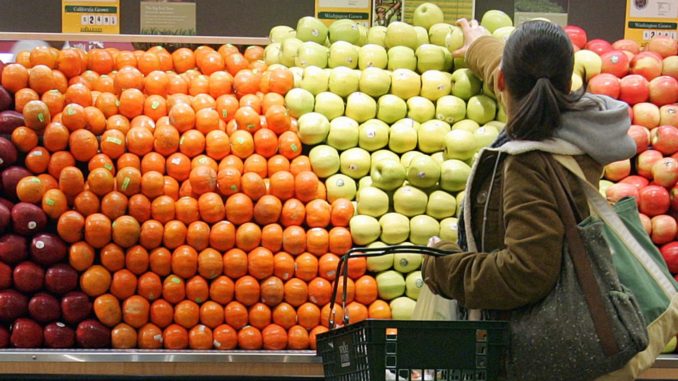
Supermarket apples are coated in a cocktail of chemicals and then left to sit in cold storage for a year before making their way to the supermarket, an investigation into food safety has revealed.
Here in the U.S., apples generally ripen between August and September. Farmers pick the apples when they’re still unripe, treat them with a chemical called 1-methylcyclopropene, wax them, box them, stack them on pallets, and then keep them in cold storage warehouses for an average of 9-12 months.

BYPASS THE CENSORS
Sign up to get unfiltered news delivered straight to your inbox.
You can unsubscribe any time. By subscribing you agree to our Terms of Use
Latest Video
I guess we should be grateful. It used to be that rather than being sprayed with 1-methylcyclopropene (also known as 1-MCP), cold storage apples were sprayed with fungicide.
From the USDA’s Agricultural Research Service, we learn this:
Apples not intended for fresh market are stored at low temperatures, with low levels of oxygen and high levels of carbon dioxide. While this slows the apples’ natural production of ethylene and its effects, fungicides must often be applied to prevent fungal rots from taking hold. But since its commercial debut in 2002 under the name “SmartFresh,” 1-MCP has in some cases diminished the need for such treatment.
(source)
In fact, the development and use of 1-MCP has made it common for apples to sit even longer in cold storage. That’s because, according the USDA’s Agricultural Research Service,
On average, treated apples stayed firm for 3 to 6 months longer than untreated controls when placed in controlled-atmosphere storage conditions. Red Delicious apples, for example, stayed crunchier 2 to 3 weeks longer than untreated controls after removal from storage.
(source)
JUST HOW LONG ARE APPLES STORED BEFORE BEING SOLD?
Food Renegade reports:
After learning that apples that have sat in cold storage for 12 months are commonly called “birthday apples” within the industry, one Australian investigative news organization decided to do a test to see just how old the apples on their grocery store shelves really were. They collected samples from major Australian supermarkets and sent them to the Sydney Postharvest Laboratory for testing.
The results?
Analysis showed the Woolworths samples were about 10 months old while the Norton Street and Coles products had spent 9 months in storage since being harvested.
(source)
BUT WHAT ABOUT IN THE U.S.?
According to Martin Lindstrom, author of Brandwashed: Tricks Companies Use to Manipulate Our Minds and Persuade Us to Buy, the average supermarket apple is 14 months old.
SHOULD YOU CARE ABOUT THE AGE OF YOUR PRODUCE?
If you want to eat apples all year long, regardless of the season, maybe you’re glad to hear that modern engineering and science have mastered the art of keeping apples “fresh” for a year or more.
Yet at what cost?
The obvious differences in flavor and texture between fresh apples and stored apples aside, what’s so bad about eating produce that’s this old?
Nutrients.
Aside from dietary fiber and sugar, apples are a rich source of polyphenols — antioxidants that can help fight cancer and improve post-workout recovery by reducing muscle fatigue.
Yet according to this study, antioxidant activity in apples gradually drops off after three months of storage in the cold. An apple stored for nearly a year? It will have almost no antioxidants remaining in it whatsoever.
This is also true of most vegetables and fruits: the less fresh they are, the less nutrients they have.
SO, HOW DO YOU GET THE MOST NUTRIENTS FROM YOUR APPLES?
Buy fresh. Don’t assume you’ll get apples year round. Buy in season. Buy from a local farmer when possible. Once you buy your apples, store them on your counter top rather than the fridge.
Quickly eat or remove bruised apples as the old saying is most certainly true, “one bad apple spoils the bunch.”
Don’t assume that buying organic apples will automatically mean you’re buying fresh apples either. Although SmartFresh (1-MCP) is not currently approved for use on organic apples, organic growers still use approved non-synthetic fungicides and controlled atmosphere cold storage to achieve a similar effect.


